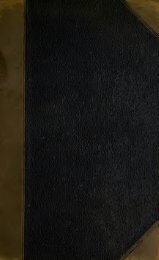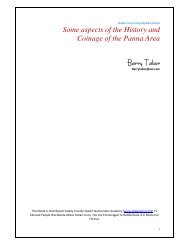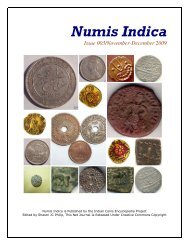- Page 7 and 8:
THENUMISMATIC CHRONICLEANDJOURNAL O
- Page 9 and 10:
THE )NUMISMATIC CHRONICLEANDJOURNAL
- Page 11 and 12:
CONTENTS.ANCIENT NUMISMATICS.PAGEGR
- Page 13:
CONTENTS.VllLISTOF PLATES CONTAINED
- Page 16 and 17:
2 G. F. HILL.ETBUEIA.Vetulonia ?Obv
- Page 18 and 19:
|PI.4: G. F. HILL.JR. ^-25mm. Wt. 2
- Page 20 and 21:
6 G. F. HILL.the coins which were u
- Page 22 and 23:
8 G. F. HILL.Lead. 33 mm. Wt. 403-6
- Page 24 and 25:
10 G. F. HILL.noted on the latter s
- Page 26 and 27:
12 G. F. HILL.A similar coin in the
- Page 28 and 29:
TOE14 G. F. HILL.IONIA.Smyrna.To th
- Page 30 and 31:
16 G. F. HILL.lasus.Obv. Heads of A
- Page 32 and 33:
18 G. F. HILL.;. Two,nude wrestlers
- Page 34 and 35:
AVTONOMOVTHZIEPAZ20 G. F. HILL.as o
- Page 36 and 37:
22 G. F. HILL.7te,._ONIKOM AXOCAPXI
- Page 38 and 39:
24 G. F. HILL.Soli. Several specime
- Page 40 and 41:
CYCPrCTDY26 G. F. HILL.PAETHIA.Orod
- Page 42 and 43:
28 G. F. HILL.. QBA
- Page 44 and 45:
30 G. F. HILL.Joel.Obv. Crowned bus
- Page 46 and 47:
32 J. G. MILNE.in view of their pec
- Page 48 and 49:
34 J. G. MILNE.spelling, or the omi
- Page 50 and 51:
types : Gj-1; 7(b); 10; 14(a); 16;
- Page 52 and 53:
38 J- G. MILNE.LAVTKAICTPAIANOC AAP
- Page 54 and 55:
40 J. G. MILNE.getting them it is;
- Page 56 and 57:
42 J. G. MILNE.11 (b).As 11 (a),but
- Page 58 and 59:
44 J. G. MILNE.i. Zeus seated 1., r
- Page 60 and 61:
46 J. G. MILNE.xx. Emperor in biga
- Page 62 and 63:
48 J- G- MILNE.Bronze.xxiii. Tyche
- Page 64 and 65:
50 J. G. MILNE.42 (a).Bust of Nilus
- Page 66 and 67:
52 J. G. MILNE.xlvii. Eagle standin
- Page 68 and 69:
54 E. A. SYDENHAM.Thus our present
- Page 70 and 71:
56 E. A. SYDENHAM.the few contempor
- Page 72 and 73:
58 E. A. SYDENHAM.11. Obv. (Similar
- Page 74 and 75:
60 E. A. SYDENHAM.and style to No.
- Page 76 and 77:
4Actual weights in grains of well-p
- Page 78 and 79:
64: E. A. SYDEXHAM.It has been sugg
- Page 80 and 81:
66 E. A. SYDENHAM.included in his r
- Page 82 and 83:
68 E. A. SYDENHAM.mint of Lugdunum
- Page 84 and 85:
70 E. A. SYDENHAM.38. Caius gallopi
- Page 86 and 87:
72 E. A. SYDENHAM.coins of Caligula
- Page 88 and 89:
74: E. A. SYDENHAM.After the year 2
- Page 90 and 91:
76 E. A. SYDENHAM.form assumed by t
- Page 92 and 93:
78 E. A. SYDENHAM.on Jan. 1, A.D. 1
- Page 94 and 95:
80 E. A. SYDENHAM.same time that he
- Page 96 and 97:
82 E. A. SYDENHAM.36 (TR-POT-XVII t
- Page 98 and 99:
84 E. A. SYDENHAM.nearly all the me
- Page 100 and 101:
86 E. A. SYDENHAM.some allusion to
- Page 102 and 103:
88 E. A. SYDENHAM.it appears practi
- Page 104 and 105:
90 E A. SYDENHAM.occur with the obv
- Page 106 and 107:
92 E. A. SYDENHAM.and not, as seems
- Page 108 and 109:
94 E. A. SYDENHAM.we find that the
- Page 110 and 111:
96 E. A. SYDENHAM.in all probabilit
- Page 112 and 113:
98 HENRY SYMONDS.(1) To Sir Edmund
- Page 114 and 115:
100 HENRY SYMONDS.then current was
- Page 116 and 117:
102 HENRY SYMONDS.which a full inve
- Page 118 and 119:
104 HENRY SYMONDS.the Irishmen cont
- Page 120 and 121:
106 HENRY SYMONDS.The proclamation
- Page 122 and 123:
108 HENRY SYMONDS.even to leaven th
- Page 124 and 125:
110 HENRY SYMONDS.The Queen's benev
- Page 126 and 127:
112 HENRY SYMONDS.George Tyson, sin
- Page 128 and 129:
114 HENRY SYMONDS.unable totrace a
- Page 130 and 131:
116 HENRY SYMONDS.For garbling (sel
- Page 132 and 133:
118 HENRY SYMONDS.sumably subsequen
- Page 134 and 135:
120 HENRY SYMONDS.the value of 50.
- Page 136 and 137:
122 HENRY SYMONDS.Dublin Castle dur
- Page 138 and 139:
124: HENRY SYMONDS.In July, 1602, t
- Page 140 and 141:
V.CONCERNING SOME EOETTIE.RS DIES.T
- Page 142 and 143:
128 HELEN FARQUHAR.II.COLONEL O'BRY
- Page 144 and 145:
130 HELEN FARQUHAR.to, as Well for
- Page 146 and 147:
132 HELEN FARQUHAR.remember to have
- Page 148 and 149:
134 HELEN FARQUHAK.1. Medal of King
- Page 150 and 151:
136 HELEN FARQUHAR.The Inscription
- Page 152 and 153:
138 HELEN PAEQUHAE.Keverse Represen
- Page 154 and 155:
HELEN FARQUHAR.33. A Medal of K. Ja
- Page 156 and 157:
142 HELEN FARQUHAR.58. The same in
- Page 158 and 159:
144 HELEN FARQUHAR.signed by John.S
- Page 160 and 161:
146 HELEN FARQUHAR.The letters appe
- Page 162 and 163:
148 HELEN FARQUHAR.of James II with
- Page 164 and 165:
150 HELEN FAKQUHAK.No. 58. Duchess
- Page 166 and 167:
152 HELEN FARQUHAR.fourth to my dau
- Page 168 and 169:
154 HELEN FARQUHAK.an Inventory of
- Page 170 and 171:
156 HELEN FARQUHAR.last think fitt
- Page 172 and 173:
158 HELEN FARQUHAR.graving coper pl
- Page 174 and 175:
160 HELEN FARQUHAR.to the late D r
- Page 176 and 177:
'1G2HELEN FARQUHAR.to the property
- Page 178 and 179:
164: HELEN FARQUHAR.These are H.M 8
- Page 180 and 181:
MISCELLANEA.THE MEDALS OF GIAMBATTI
- Page 182 and 183:
168 MISCELLANEA.Keary, No. 91. (8)
- Page 185:
NUM. CHRON. SER. IV., VOL. XVII.PL.
- Page 189:
NUM. CHRON. SER. IV., VOL. XVII.PL.
- Page 193:
NUM. CHRON. SER. IV., VOL. XVII.PL.
- Page 197:
PROCEEDINGSOP THE
- Page 200 and 201:
4: PROCEEDINGS OF THE9. J. G. Milne
- Page 202 and 203:
6 PEOCEEDINGS OF THEthe light shill
- Page 204 and 205:
8 PROCEEDINGS OF THEFeb. 6, 1888, "
- Page 206 and 207:
10 PROCEEDINGS OF THEMARCH 15, 1917
- Page 208 and 209:
12 PROCEEDINGS OF THEMr. L. G. P. M
- Page 210 and 211:
STATEMENT OF KECEIPTS AND DISBUKSE-
- Page 212 and 213:
16 PROCEEDINGS OF THEThe Reports of
- Page 214 and 215:
18 PROCEEDINGS OF THEthe Short-Cros
- Page 216 and 217:
20 PKOCEEDINGS OF THEwhy I should h
- Page 218 and 219:
22 PROCEEDINGS OF THE ROYAL NUMISMA
- Page 220 and 221:
FIG. 2.Obverse.FIG. 2.Reverse.
- Page 222 and 223:
26 PKOCEEDINGS OF THEof some of the
- Page 224 and 225:
28 PROCEEDINGS OF THEby his gift of
- Page 226 and 227:
30 PKOCEEDINGS OF THEcarefully sele
- Page 228 and 229:
32 PROCEEDINGS OF THEillustrated by
- Page 230 and 231:
34 PROCEEDINGS OF THEto commemorate
- Page 232 and 233:
36 PROCEEDINGS OF THEthe earliest o
- Page 234 and 235:
38 PROCEEDINGS OF THEthe original c
- Page 236 and 237:
40 PROCEEDINGS OF THEthe earlier pe
- Page 238 and 239:
42 PROCEEDINGS OF THE ROYAL NUMISMA
- Page 240 and 241:
170 S. W. GKOSE.print, in the first
- Page 242 and 243:
172 S. W. GKOSE.c Clean Coll. ;Ward
- Page 244 and 245:
174 S. W. GROSE.(e)(*)(t)E0) APir(&
- Page 246 and 247:
176 S. W. GROSE.Many attempts have
- Page 248 and 249:
178 S. W. GROSE.the views there exp
- Page 250 and 251:
180 S. W. GROSE.The Icoins at Tare
- Page 252 and 253:
182 S. W. GKOSE.is the commonest co
- Page 254 and 255:
184 Sc W. GROSE.much, later type of
- Page 256 and 257:
186 S. W. GROSE.name is possible,of
- Page 258 and 259:
188 S. W. GROSE.as provedthis artis
- Page 260 and 261:
VII.THE CHRONOLOGY OF THE COINAGE O
- Page 262 and 263:
192 C. OMAN.disputed the crown afte
- Page 264 and 265:
194 C. OMAN.that his wife was, if n
- Page 266 and 267:
196 C. OMAN.were roused, and he for
- Page 268 and 269:
198 C. OMAN.left,sometimes draped,
- Page 270 and 271:
200 C. OMAN.belong, was the posthum
- Page 272 and 273:
202 C. OMAN.nor would she loose her
- Page 274 and 275:
204 C. OMAN.Ill, to Tripolis in 105
- Page 276 and 277:
206 C. OMAN.with the portrait showi
- Page 278 and 279:
208 J. MAVKOGORPATO.Antiochus II of
- Page 280 and 281:
210 J. MAVROGORDATO.show later on,
- Page 282 and 283:
212 J. MAVROGORDATO.of Augustus. Th
- Page 284 and 285:
214 J. MAVROGORDATO.I base this sug
- Page 286 and 287:
216 J. MAVROGORDATO.M. ff 19-00 mm.
- Page 288 and 289:
218 J. MAVROGORDATO.700. Same as pr
- Page 290 and 291:
220 J. MAVROGORDATO.ft 15-25-11-75
- Page 292 and 293:
222 J. MAVIIOGOKDATO.To one of the
- Page 294 and 295:
224 J. MAVKOGOEDATO.79. Obv. Naked
- Page 296 and 297: 226 J. MAVROGORDATO.\f 15-50-13-00
- Page 298 and 299: 228 J. MAVROGORDATO.JR. f| 19-00 mm
- Page 300 and 301: 230 J. MAVROGORDATO.immediately fol
- Page 302 and 303: 232 J. MAVROGOKDATO.of the large br
- Page 304 and 305: 234 J. MAVROGORDATO.its contemporar
- Page 306 and 307: 236 J. MAVROGORDATO.above it. The k
- Page 308 and 309: 238 J. MAVKOGORDATO.which appears o
- Page 310 and 311: 240 J. MAVEOGORDATO.may be made bet
- Page 312 and 313: 242 J. MAVROGORDATO.The die-positio
- Page 314 and 315: 24:4 J. MAVROGOEDATO.those on the o
- Page 316 and 317: 246 J. MAVKOGOKDATO.drachms, but th
- Page 318 and 319: 248 J. MAVROGORDATO.The lettering o
- Page 320 and 321: 250 J. MAVROGOKDATO.some badly pres
- Page 322 and 323: 252 J. MAVKOGOKDATO.Symbols appear
- Page 324 and 325: 254 J. MAVROGORDATO.at this late pe
- Page 326 and 327: 256 J. MAVROGORDATO.feature at this
- Page 328 and 329: IX.DIVUS AUGUSTUS.[SEEPLATE XL][THE
- Page 330 and 331: 260 E. A. SYDENHAM.There are, howev
- Page 332 and 333: 262 E. A. SYBENHAM.until after her
- Page 334 and 335: 264 E. A. SYDENHAM.Tiberius. Their
- Page 336 and 337: 266 E. A. SYDENHAM.seems clear, how
- Page 338 and 339: 268 E. A. SYDENHAM.probably in hono
- Page 340 and 341: 270 E. A. SYDENHAM.suppose that the
- Page 342 and 343: 272 E. A. SYDENHAM.Claudius are exe
- Page 344 and 345: 274 E. A. SYDENHAM.12. Obv. Dl VVS
- Page 348 and 349: 278 E. A. SYDENHAM.ing the radiate
- Page 350 and 351: 280 J. SHIRLEY-FOX AND H. B. EARLE
- Page 352 and 353: 282 J. SHIKLEY-FOX AND H. B. EARLE
- Page 354 and 355: 284 J. SHIRLEY-FOX AND H. B. EARLE
- Page 356 and 357: 286 J. SHIRLEY-FOX AND H. B. EARLE
- Page 358 and 359: 288 J. SHIRLEY-FOX AND H. B. EARLE
- Page 360 and 361: 290 J. SHIRLEY-FOX AND H. B. EAKLE
- Page 362 and 363: 292 J. SHIRLEY-FOX AND H. B. EAELE
- Page 364 and 365: 294 J. SHIRLEY-FOX AND H. B. EARLE
- Page 366 and 367: 296 J. SHIRLEY-FOX AND H. B. EARLE
- Page 368 and 369: XITHE MEDALS OF MATTEO DE'PASTI.THE
- Page 370 and 371: 300 G. F. HILL.specimen appears mor
- Page 372 and 373: 302 G. F. HILL.SISMONDVM seem to be
- Page 374 and 375: 304 G. F. HILL.93 mm. :Heiss, Alber
- Page 376 and 377: 306 G. F. HILL.Atti (Isotta degli).
- Page 378 and 379: 308 G. F. HILL.13. Olv. Same as No.
- Page 380 and 381: 310 G. F. HILL.Mus., 1435-1855, f 4
- Page 382 and 383: 312 G. F. HILL.25. Obv. rDrlSOTTAEA
- Page 384 and 385: MISCELLANEA.The reverse (also doubl
- Page 386 and 387: 316 MISCELLANEA.with the reverse ty
- Page 388 and 389: '318 MISCELLANEA.belong to the cast
- Page 390 and 391: 320 OBITUARY.his former labours, an
- Page 392 and 393: 322 NOTICES OF RECENT PUBLICATIONS.
- Page 394 and 395: 324 INDEX.CO PI A) inscription on c
- Page 396 and 397:
,documents326 INDEX.Pasti, Matteo d
- Page 399:
NUM. CHRON. SER. IV., VOL. XVII.PL.
- Page 403:
NUM. OHRON. SER. IV., VOL. XVII. PL
- Page 407:
LIST OF FELLOWSOF THEROYAL>NUMISMAT
- Page 410 and 411:
4 LIST OF FELLOWS.ELECTED1906 BEATT
- Page 412 and 413:
6 LIST OF FELLOWS.ELECTED1907 ELDER
- Page 414 and 415:
8 LIST OF FELLOWS.ELECl'BD1900 HEWL
- Page 416 and 417:
10 LIST OF FELLOWS.ELRCTED1905 MILL
- Page 418 and 419:
12 LIST OF FELLOWS.ELECTED1903 RUBE
- Page 420 and 421:
14 LIST OP FELLOWS.ELECTED1885 *WEB
- Page 422:
16MEDALLISTSOF THE ROYAL NUMISMATIC

















